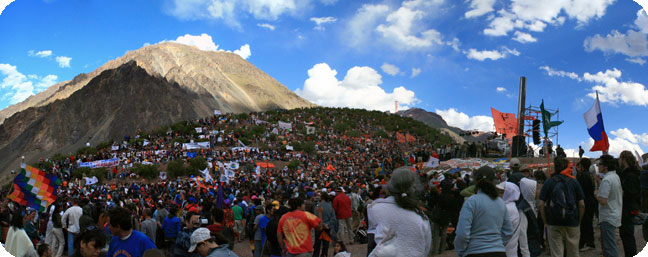Previous Symposiums
First International Symposium: “Ethics in Knowledge”
Punta de Vacas Park, Argentina, November 13,14 and 15, 2008
For more than seven million years the human species has proceeded tirelessly in its evolution, overcoming the initial primitive makeup that limited its capabilities. Our knowledge and experiences have accumulated in response to our primary human desires: freedom from physical pain and mental suffering.
The human being, as a result of the impressive qualities of its own conscience, has increasingly moved away from determinism, in contrast to other living species that do little more than respond to the stimuli of the natural world. Furthermore our ability to be conscious of our own conscience – that is to be conscious of our own existence – has opened the door for an ethical awakening that has provided meaning to our lives and to the future of humanity.
There can be no justification for an individual or a group of individuals taking ownership of the common destination of human beings for their own personal end(s). Nobody can monopolize accumulated human knowledge for themselves, nor claim possession of the common heritage of mankind. Nothing that has been created by a human being is isolated from the work of those who preceded him, from those who coexist with him now or from those who will follow in the future.
History tells us that violence can not be resolved with further violence, knowing that morally there is never justification for it; we make a plea for reflection, for the development of a widespread mantra of non-violence with the aim of providing one more ethical pathway which will allow us human beings to separate from our former primitive existence.
In our constant search for liberating answers, we believe that diversity as opposed to uniformity, guarantees a higher probability for a solution. Therefore, knowledge must consist of different viewpoints as a prerequisite for collective growth, common direction between cultures and reconciliation, both social and personal.
During the Symposium a charter was launched, akin to the Hippocratic Oath for Medical Professionals, with the hope of it reaching study groups, research sites, schools and universities. This call should resound in the hearts and in the consciousness not only of scholars, but also of all who 'share' this planet. In order that the destructive direction that our complex world has taken today is modified, reflection on the relationship between ethics and knowledge is crucial.
l Symposium
November 11 and 12: Opening of the Symposium at the University of Santiago de Chile and di Mendoza (Argentina).
November 13 to 15: The Symposium continued at Punta de Vacas Park. There were 6 Round tables and 14 Workshops of interchange, with the participation of 62 panelists from 21 countries of Europe, Asia, Africa and the Americas. There were 3 book presentations of the World Center of Humanist Studies, 4 showings of documentaries and 3 Conferences. In addition "The Structural Dynamic Method", with which the Centers carry out their studies worldwide, was presented.
Blocks:
● The vision of Universalistic Humanism
● Ethics in Political Action
● Ethics in Exact and Natural Sciences
● Ethics in Social Sciences
● Ethics in Health and Education
● Ethics, Culture and Spirituality
In a southern region of the world, near the roof of the West, over 500 participants decided to undertake and disseminate widely the following ethical commitment: “I choose and commit myself: To impel the development of knowledge above what is accepted as the absolute truth. I commit myself to apply this knowledge only for the well-being of the human being, in order to overcome pain and suffering”.
Some conferences translated to English:http://www.cmehumanistas.org/en/category/events/simposium-ethics-knowledge-2008

European Symposium on Non-Violence
Attigliano, Italy, on 24 and 25 April, 2009
The main focus of the Symposium was to highlight the current historical crisis and its key essence: violence in the viewpoints and actions of people and nations, and to propose non-violent solutions for the problem. The first immediate proposal was to support the World March for Peace and Non-violence, which took place during the final trimester of 2009.
We are living through the first world crisis, of which no human being is immune. What is in crisis is not a specific civilization, which might be replaced with another one as has so many times happened in our past, but rather, a way of seeing the world, human beings and relationships, which is currently a view clouded by violence.
The way out of this crisis will therefore come from a new perspective of ourselves, as individuals and as a society, a perspective where non-violent means prevail, in which the human being is an end in itself and no longer a means to an end.
The Centres of Humanist Studies of Europe, through this Symposium, wanted to look at the presence of violence in all fields with the intent of finding suitable answers, further highlighting the only alternative: non-violence.
The Symposium consisted of 13 rapporteurs from 7 different countries, the organization of 3 panels and numerous opportunities for networking and several artistic - cultural events.
Thematical Areas:
● Politics
● Economy
● Culture and Religions
● Disarmament
● Education
● Women and Young people
● Health
Conferences: http://www.csuroma.org/dokuwiki/doku.php?id=eventi:simposio02:start

The main focus of the Symposium was to highlight the current historical crisis and its key essence: violence in the viewpoints and actions of people and nations, and to propose non-violent solutions for the problem. The first immediate proposal was to support the World March for Peace and Non-violence, which took place during the final trimester of 2009.
We are living through the first world crisis, of which no human being is immune. What is in crisis is not a specific civilization, which might be replaced with another one as has so many times happened in our past, but rather, a way of seeing the world, human beings and relationships, which is currently a view clouded by violence.
The way out of this crisis will therefore come from a new perspective of ourselves, as individuals and as a society, a perspective where non-violent means prevail, in which the human being is an end in itself and no longer a means to an end.
The Centres of Humanist Studies of Europe, through this Symposium, wanted to look at the presence of violence in all fields with the intent of finding suitable answers, further highlighting the only alternative: non-violence.
The Symposium consisted of 13 reporters from 7 different countries, the organization of 3 panels and numerous opportunities for networking and several artistic - cultural events.





